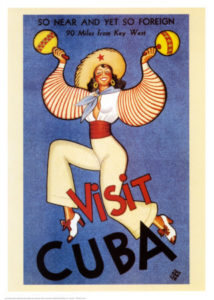 Despite my day job and this Foreign Policy Association endeavor writing on Cuba, sometimes I do not fully appreciate how challenging it actually can be for Americans to gain U.S. government approval to visit the island. Like so many things, one can talk about this issue every day in a broad sense and in so doing lose track of the intricacies of the process, the actual bureaucratic realities, the hard facts on what it actually means when we talk about “loosened” or “tightened” travel regulations. And as a Cuban-American, I do not have the same web of regulations to get in my way.
Despite my day job and this Foreign Policy Association endeavor writing on Cuba, sometimes I do not fully appreciate how challenging it actually can be for Americans to gain U.S. government approval to visit the island. Like so many things, one can talk about this issue every day in a broad sense and in so doing lose track of the intricacies of the process, the actual bureaucratic realities, the hard facts on what it actually means when we talk about “loosened” or “tightened” travel regulations. And as a Cuban-American, I do not have the same web of regulations to get in my way.
Today, however, I spent a frustrating day getting into the details.
It began without much fanfare. We decided to look into sending a small delegation of our Board members to Havana for meetings with high level officials and NGO leaders, economists and academics, U.S. Interests Section representatives, and so on. The idea is a good one. This kind of exchange is worthwhile and necessary, and promotes greater understanding on both sides.
I knew from following travel developments closely that this kind of travel should be licensable. Certain I would be able to work through the license process quickly, I jumped into a review of OFAC (Office of Foreign Assets Control) policies and began to comb through recent interpretations of the changes announced in April by the Obama administration.
But for some reason, I could not make what I was seeing in the regulations correspond to what I was reading from analysts and other Cuba watchers. Where was the clause that said my delegation could pursue a people-to-people license?
The disconnect was infuriating. The legal jargon was mind-numbing. I became certain that my group simply would not be allowed to travel. For the first time, these travel regulations seemed to have placed an actual roadblock before me.
Only after hours of reading and sifting and reasoning about how I could make this work for my delegation did my very kind colleague John McAuliff finally save me by pointing out that the document here on the OFAC website (to which the site links throughout the application process) is out of date. THIS is the one I should have been looking at all along.
And what a huge difference it made! For my special case, the language shift is dramatic in 515.565(b), from referring only to students in accredited U.S. institutions to developing an entirely new clause to include my group:
OFAC may issue a specific license to an organization that sponsors and organizes programs to promote people-to-people contact authorizing the organization and individuals traveling under its auspices to engage in educational exchanges not involving academic study pursuant to a degree program.
Hallelujah! So the new “loosening” did appear to have some beneficiaries.
… But apparently we beneficiaries are in for a logjam: the approval process. We may fit within the regulations, but so do thousands of others that have applied in the past several months and whose applications remain pending at OFAC.